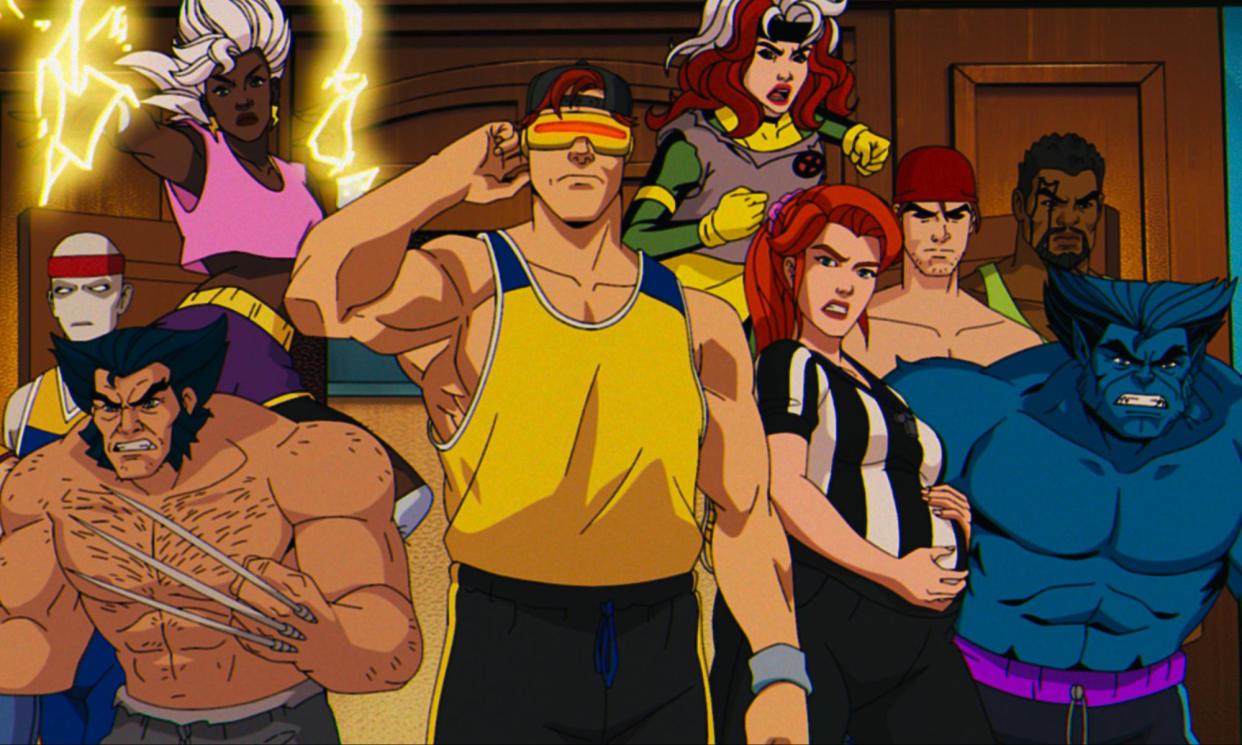A marvel: how did X-Men ’97 become one of the year’s best shows?

It should have been what Magneto refers to as a “nostalgic parlor trick” – reviving the X-Men cartoon that aired on Saturday mornings throughout much of the 90s for the Disney+ streaming service. Isn’t this what all streaming services do? They comb through their back catalog to see what IP can be exploited, promising both nostalgia and, of course, a fresh new spin on whatever thing you’ve already seen before. So while it was a given that a certain number of X-Men fans would be on board for X-Men ’97, which just completed its 10-episode first season with a second already on the way, it’s still a bit surprising that a revival of an ambitious, sometimes-clunky 90s-kid object of obsession would become one of the year’s most beloved TV shows.
Related: Disney to ‘focus on quality’ as it plans to cut output – including Marvel movies
Some of it may be hunger for any kind of ongoing X-Men series outside of the comics, which remain, as ever, a relatively niche interest. (For every restart at issue no 1, there’s several volumes of backstory that must be summarized to even begin to understand what the hell is going on.) After the Fox network aired the X-Men cartoon, the live-action movie studio adapted the characters into the first major superhero movies of the new millennium, helping to kickstart a major cultural trend. The Fox X-Men movies ran for an impressive 20 years, but Disney’s purchase of the studio coincided with a couple of box office flops in the form of Dark Phoenix and the much-delayed, pandemic-released The New Mutants. A curtain call of sorts is coming this summer with Deadpool & Wolverine, but that movie will also integrate the wisecracking Ryan Reynolds mercenary (who spun off from the X-Men movies) into the broader MCU. As such, it’s been four years since there was an X-Men movie in theaters – and longer since the last one that really connected with audiences, 2017’s Logan.
But X-Men ’97 also has a style of its own – distinctive, even, from the cartoon that spawned it. In the first few episodes, it felt like the series was closely imitating an outdated Saturday-morning cartoon style – the picture of nostalgia revived, placed into a nonsensically widescreen frame (why is a show based on an old Saturday-morning cartoon letterboxed like it was designed to play in movie theaters?!). But the show quickly evolved into a more stylized version of the old show, to the point where it looks more like viewers’ memories of the animation than the genuine article. The slightly limited movements remain – the old show was never as fluid as, say, Batman: The Animated Series, and this new one isn’t either – but the close-ups are more frequent and more evocative, the colors more cranked-up, the sights more outlandish than what audiences typically get in their live-action spectacles.
This is always supposed to be an advantage of telling superhero stories in animation, of course; see the wildly inventive Spider-Verse movies for further examples. But frankly, the technology exists to create visually stunning live-action/animated hybrid movies; it’s just that the big-screen MCU often uses that tech to rush movies through post-production to make all-important release dates. Any Marvel fan taken aback by the Zoom-call chintziness of Ant-Man and the Wasp: Quantumania might come away from X-Men ’97 feeling reinvigorated. The advantage the series has seems to be psychological as much as logistical; as an animated show, based on an old Saturday-morning cartoon no less, it feels a certain freedom to indulge its melodramatic side; to give the dialogue a certain comic-book-y declamatory poetry; to allow the formation of soapy love triangles like the one between Rogue, Gambit and Magneto. (This also forms a stark contrast with the current MCU, where characters are barely allowed to kiss.) And in contrast to over-serialized movies that sometimes feel like big-screen TV episodes, X-Men ’97 is full of good old-fashioned week-to-week cliffhangers, unencumbered by a master-plot trudge toward a major crossover.
Technically speaking, X-Men ’97 has its own shared-universe baggage with other Marvel animated shows of the 90s; those current-season cameos from the likes of Daredevil, Spider-Man, Captain America and so on are the specific, previously introduced versions of those characters. But they’re allowed to remain at truly Easter-eggy levels without a lot of portent. (Save that for Apocalypse, who makes two different dun-dun-dun appearances in the season finale, on two separate timelines. The X-Men are truly on another level.)
In fact, the success of X-Men ’97 inadvertently doubles as proof of concept for what an unwieldy fit the X-Men would be for the current MCU – or any live-action universe that’s already populated with dozens of its own superheroes, alternate dimensions, time-travel stories and so on. Sure, it’ll probably be fun to see some of our old Fox-version pals again in Deadpool & Wolverine (expect a world record for superhero cameos), but those are the effectively stripped-down versions that had their own series to expand for years.
The full X-Men experience encompasses so much lore – from the grounded concerns about discrimination, fear of the other, and surveillance to the vastness of Jean Grey’s Phoenix powers and other impossibly cosmic ideas – that it feels like it would take decades to build up at a rate of even one movie a year (which seems unlikely anyway). One of the best things about X-Men ’97 is how incompatible it feels with the military-industrial complex of the MCU – even at their coziest moments with the government, the characters feel more haunted, hunted and conflicted than the more straight-arrow Avengers. It’s still a silly cartoon show that exists because of 90s-kid nostalgia. But in a world that often dilutes comic-book storytelling into a thin gruel, the all-in soap-opera goofiness of these animated X-Men feels richer and weirder than ever.

